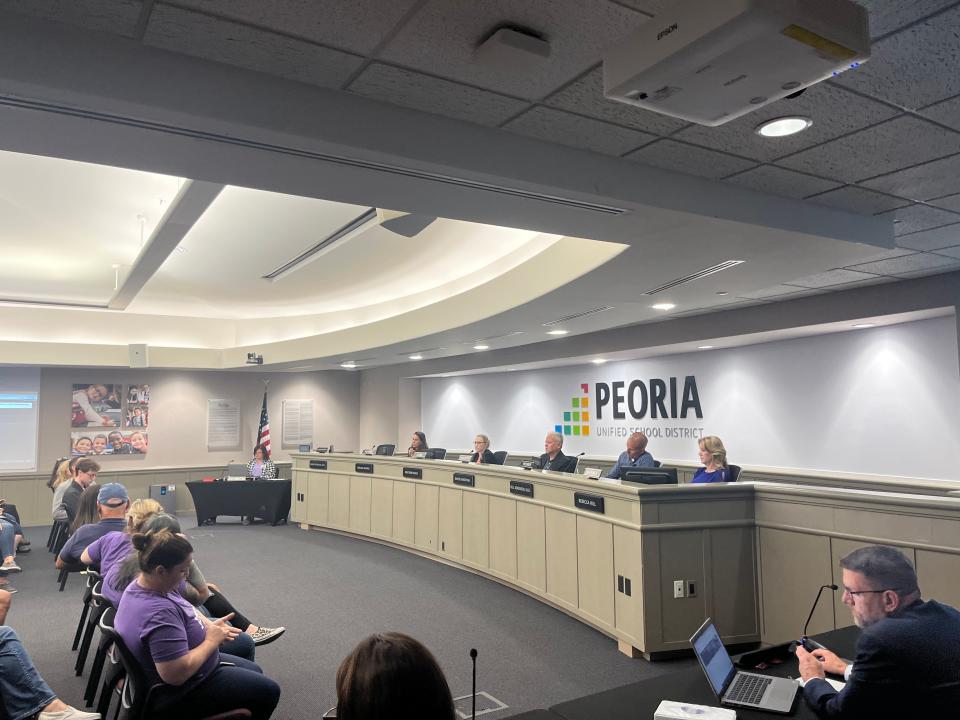If presidents can officially recite Bible verses, why can't a Peoria school board member?
- Oops!Something went wrong.Please try again later.
Since the founding of our republic, elected officials have quoted sacred texts while carrying out their duties.
But now, an Arizona school board member’s brief recitation of scripture at board meetings has made her the target of outside activist groups, who have harassed her with complaints, accusations and threats of legal action.
Heather Rooks, a member of the Peoria Unified School District governing board in Glendale, stood before a room full of parents prepared to conduct business and respond to questions and concerns on a wide array of issues.
She readied herself by quoting an inspirational verse from the Bible. Rooks finds encouragement, strength and inspiration from the words of wisdom she recites prior to carrying out the duties of a school board member.
Rooks recited Bible verses during meetings
As a mother of four, she understands the importance of a quality education for all children and enthusiastically embraces her role.
So, imagine her surprise when days later she received a “cease-and-desist” letter demanding that she stop quoting a familiar passage.
The verse she quoted at her first board meeting that prompted objections from outside anti-religious groups is Isaiah 41:10, which reads in part: “Do not fear, for I am with you; Do not anxiously look about you, for I am your God.”
Rooks sues Peoria district: Over Bible verses at board meetings
For quoting this oft repeated verse from Hebrew scriptures, during a period of the meetings when school board members could comment on any topic, she was accused of “violating the Establishment Clause” of the First Amendment and told that she was not allowed to read scripture in her “official capacity” as a school board member.
What her accusers fail to understand is citing a quotation from any text for the purpose of encouragement or inspiration is completely protected under the free speech and free exercise clauses of the U.S. Constitution.
Many presidents have quoted from the Bible

U.S. presidents understand this.
Throughout history, in their “official capacity,” many have recognized or quoted religious texts they felt were appropriate for the occasion.
When President Abraham Lincoln addressed the nation at his second inauguration in 1865, he reminded Americans that the Book of Matthew teaches “[t]he Almighty has His own purposes. ‘Woe unto the world because of offenses for it must needs be that offenses come but woe to that man by whom the offense cometh.’ ”
On Jan. 25, 1941, President Franklin Roosevelt wrote a letter to the Armed Forces in which he stated: “As Commander-in-Chief I take pleasure in commending the reading of the Bible to all who serve in the armed forces of the United States. Throughout the centuries men of many faiths and diverse origins have found in the Sacred Book words of wisdom, counsel and inspiration. It is a fountain of strength and now, as always, an aid in attaining the highest aspirations of the human soul.”
While in his official capacity as president, Barack Obama attended a somber event to console the families grieving in the wake of the Sandy Hook school shooting.
He acknowledged that in the crowd “many world religions were represented,” yet he quoted from the Bible at the beginning and end of his short speech. “… do not lose heart. Though outwardly we are wasting away … inwardly we are being renewed day by day … .”
He could have quoted Shakespeare, Tennyson, Robert Frost, Aristotle or any other inspirational source appropriate for the moment, but he chose words that seemed most fitting to comfort, calm, strengthen and encourage those who were grieving in the aftermath of such a horrible tragedy.
If they can exercise their right, why can't she?
In her official capacity as a Peoria school board member, Rooks — like former presidents Bill Clinton, John F. Kennedy, Ronald Reagan and others — exercised her First Amendment right that protects the freedom of all Americans to quote a sacred text in any public or private setting.
Why can U.S. presidents quote the Bible or any other religious text but not a member of the Peoria school board?
In Kennedy v. Bremerton School District, Supreme Court Justice Gorsuch said, “Nor does … a proper understanding of the Amendment’s Establishment Clause require the government to single out private religious speech for special disfavor. The Constitution and the best of our traditions counsel mutual respect and tolerance, not censorship and suppression, for religious and nonreligious views alike.”
Heather Rooks isn’t a famous historical figure or a household name, but she too wants to be part of the longstanding tradition of government officials solemnizing public occasions.
The First Amendment declares that she has every right to do so.
Andy Gould, a former member of the Arizona State Supreme Court, is senior counsel at First Liberty Institute, a nonprofit law firm representing Rooks in a lawsuit against the Peoria school district. Learn more at FirstLiberty.org.
This article originally appeared on Arizona Republic: If presidents can quote the Bible, why not a school board member?

